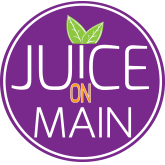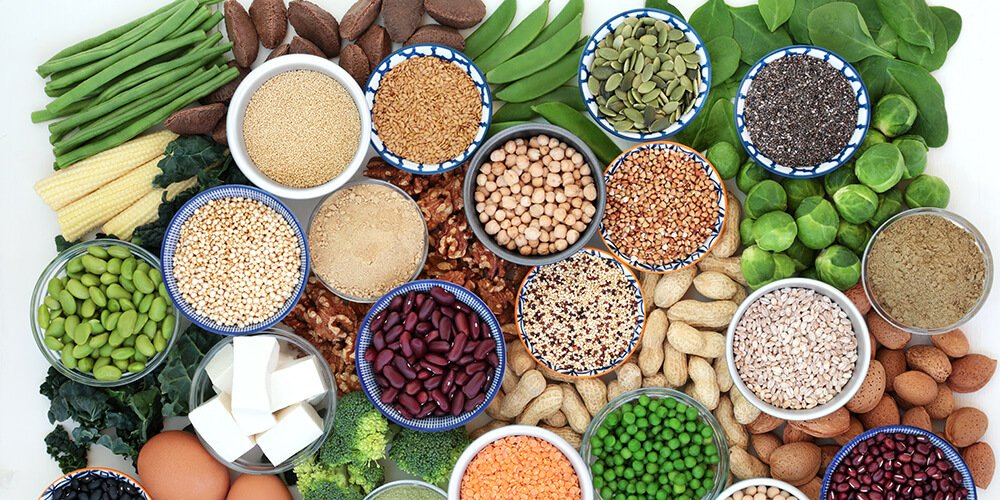The Best Plant-Based Protein Sources
Whether you have gone vegan or just trying to eat more plants, getting enough protein always seems to be a concern. And from your grandmother to that nosy neighbor, opinions seem to be given out like they’re going out of style when it comes to vegan food. But we are here to tell you that plant-based protein is popping up everywhere nowadays, making it that much easier to get your recommended daily intake. Oh, and speaking of daily intake, there is generally a BIG misconception about daily protein needs. Most Americans exceed the daily suggested protein intake and do not meet the recommended intake for nutrient-dense vegetables, fruit, and whole grains. 10-35% of your daily caloric intake should come from protein. So rather than add a whole hunk of meat and add to your dish from there, consider making the focal point of your plate come from plants instead. Start with veggies and greens and build out - adding plant-based sources of protein - and you’ll get a balanced meal with loads of benefits that meet your nutritional needs.
Benefits? Did you know that a plant-based diet can boost heart health and help with weight loss and weight maintenance? Also, diets based around plants rather than meat had the most positive effects on LDL, aka “bad” cholesterol levels. Check out this recent trial study published by the American Journal of Clinical Nutrition. Plus, eating more plant protein can help life longevity. A study published in 2020 by JAMA Internal Medicine showed that processed and unprocessed meats correlate to a higher incidence of heart disease, and reports from the National Institutes of Health tout red meat specifically to shorten one’s life span. An additional study claimed that those who ate more plant-based foods - think whole grains, legumes, vegetables, fruits, and nuts - and reduced their refined grains and sugars and red and processed meats could extend their lifespan by several years (up to 9 years - wow)! And, of course, if protecting the environment tops your priority list, take note that adopting a plant-based diet and lifestyle can significantly reduce greenhouse gas emissions.
Now, for the good stuff. If you are just beginning this plant-based path or need the motivation to get back on track, check out the list below for the best plant-based protein sources.
1. Lentils
Loading up on lentils is a surefire way to pack a protein punch! Not to mention the amount of fiber, vitamins, minerals, and phytonutrients that these little legumes can add to your daily diet. At up to 9 grams of protein in a half-cup serving, lentils are a must when it comes to planning out protein-packed meals for the week. Add to soups, stews, and veggie burgers - these babies get a gold star for their nutritional boost.
2. Beans
Beans, beans, the musical fruit. The more you eat, the more...benefits for your body, of course! And there are so many to choose from - black beans, pinto beans, kidney beans, cannellini beans, navy beans - need I say more? The list, and nutritional gains, goes on with more than 20 varieties. Beans will fill you with essential nutrients from fiber to folate, magnesium to iron, and you guessed it - protein! You can easily add almost 8 grams of protein to your plate with just a half-cup serving of black beans. So toss them in salads, soups, stews, stir-fry, wraps, burritos, veggie burgers, and voila - an instant, easy protein-packed meal!
3. Nuts
Another good source of protein (with plenty to choose from), nuts are next on our list. Almonds and pistachios (a complete protein) produce the highest gains with 5 to 6 grams of protein per serving (less than a quarter cup). But any nut of choice will do! Not only will nuts offer you protein, but they are a good source of unsaturated fats, which are heart-healthy since they help to reduce cholesterol levels. So choose almonds, pistachios, cashews, walnuts, or hazelnuts, and add a handful to your diet. They can be sprinkled on salads or added to smoothies or veggies. And don’t forget nut butter! It makes for a good variation for smoothies, toasts, dipping, or to add to just about anything!
5. Peanut Butter
Delicious, easy, and - as long as you buy organic, healthy versions (should never have more than two ingredients - peanuts and salt, if you choose), it is a good quality source of high, plant protein. Just be sure to keep your serving sizes in check. One serving, or two tablespoons, of this deliciousness clocks in at 7 grams of protein and 180 calories, so be sure not to overdo it! Pair peanut butter with apples, your favorite fruit, or whole grain bread for a little PB + J action, or enjoy it just by the spoonful! Really, is there anything that peanut butter doesn’t make taste better?
6. Chia
Ch-, ch-, ch-, chia! These seeds may be small, but they sure are mighty! Loaded up with 5 grams of protein and 10 grams of fiber per ounce, they are top-ranked for plant-based protein! Also high in iron, selenium, magnesium, omega-3 fatty acids, antioxidants, and plenty more beneficial plant compounds, they offer great versatility with a mild taste. Due to their consistency and ability to absorb water - which makes them form a gel-like substance - you can easily add them to smoothies, puddings, oatmeal, and baked goods.
7. Quinoa
This seed is typically placed in the whole grains category and is a nutritional powerhouse. Quinoa is a complete protein and contains all nine essential amino acids. Sometimes swapped into meals in place of other grains, just one cooked cup of this fluffy, nutty deliciousness packs 8 grams of protein and 5 grams of fiber. Because of its versatility, it is the perfect match for any meal. Quinoa cooks up quickly as a breakfast cereal (like oatmeal) with plant-based milk and added fruits, and can be easily added as protein in your salad for lunch, or used in place of pasta for dinnertime.
8. Soy
Soy is another super protein source that provides the body with all nine essential amino acids. There are plenty of ways to incorporate this complete protein into your diet from soy milk to edamame to miso and soy nuts. If you’re looking for the occasional meat substitute, seek out soy and add tofu or tempeh to your plate instead. Filled with potassium and iron, a 3-ounce serving offers about 9 grams of protein and can be rather tasty in a stir-fry or roasted with vegetables. As for controversial claims about soy, the blanket statements have been debunked. Soy is a nutrient-dense protein source that is safe to eat several times a week!
9. Peas
Growing up, you may remember hearing to “eat your peas”! Well, your parents may have been on to something. Peas contain almost 9 grams of protein per serving and significant amounts of amino acids - leucine, lysine, and glutamine. Plus, this petite-sized protein is high in fiber! So, pile them into your pasta, soups, salads, rice pilaf, and more!
10. Chickpeas
Chickpeas, or garbanzo beans, another legume, will add richness to your dish. High in protein plus folate, fiber, phosphorus, fatty acids, and iron, you will get close to 7.5 grams of protein in one half-cup serving. Like many of the above, they can be tossed in soups and stews, wraps and burgers, or make for a tasty, crispy snack roasted by themselves. And, of course, they can be found most commonly as the main ingredient in hummus!
11. Hemp Seeds
These tiny little seeds host a whole lot of health benefits. Hemp seeds contain all nine essential amino acids, which can play an important role in tissue and muscle growth, energy production, immune function, and nutrient absorption. Just 3 tablespoons can provide about 10 grams of protein - wow! Sprinkle these hemp seeds (or hemp hearts - the shelled hemp seeds) on your salads, soups, yogurt, or nut-buttered toast. They will add a little extra nutty flavor and a nice little crunch!
The Lowdown
Hopefully, this mini guide will help to incorporate more plant-based proteins into your daily diet. As long as you follow a healthy, well-planned diet and lifestyle, there is no need to worry about protein deficiencies. You may even surprise yourself with a new lineup of nutrients that will benefit your body and our earth!

